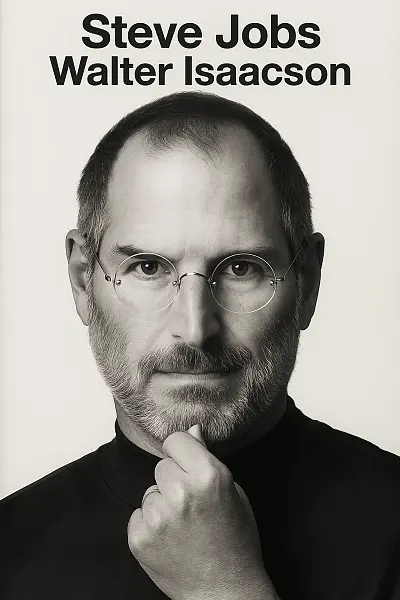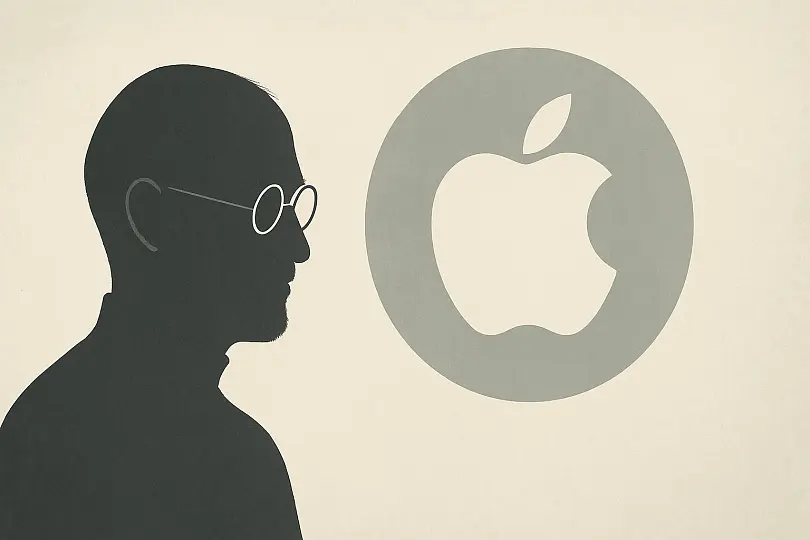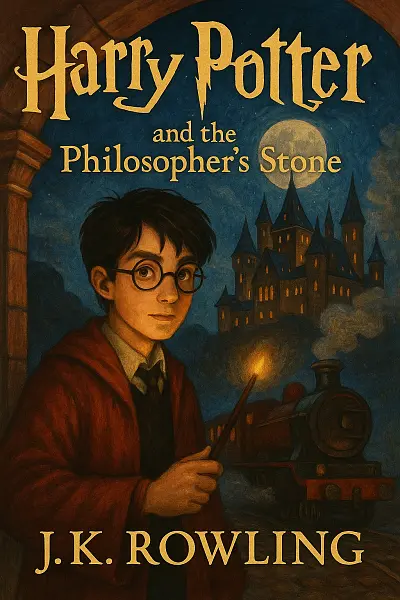
Steve Jobs
by: Walter Isaacson
Steve Jobs grows up in Silicon Valley, a restless visionary obsessed with art and technology. Driven by a need for perfection and innovation, he challenges norms at every turn, reshaping how people interact with the digital world. But when he faces fierce competition and internal clashes at Apple, Jobs is forced to confront the cost of his relentless ambition.
As Jobs battles his own flaws and relationships, he must decide whether vision or empathy will define his legacy. Isaacson’s storytelling is intimate and sharp, mixing candid revelations with a whirlwind pace, keeping you wondering—can Jobs truly balance genius with humanity?
"Genius thrives where passion dares to challenge the ordinary, refusing to settle for anything less than extraordinary."
Let's Break This Down
The Author's Voice
Atmosphere
- Energetically charged yet intimate: The text hums with Silicon Valley intensity, yet pulls readers into private boardrooms and turbulent personal conversations
- Candid and unvarnished: Isaacson crafts an environment of unfiltered honesty, often exposing the raw, sometimes abrasive reality behind the innovation
- Cultivated nostalgia: Infused with a sense of pivotal historical moments, there’s a wistful air for the rebellious idealism of late-20th-century tech culture
Prose Style
- Accessible and crisp: Sentences are lean, rarely florid—Isaacson’s style is journalistic, clear, and never drags under the weight of jargon
- Detail-rich narration: Anecdotes and quotes are smartly woven in, with dialogue that feels immediate; you’ll catch the crackle of Jobs’s intensity in every exchange
- Objective but warm: There’s a human touch, a careful balancing act between critical distance and empathetic insight—expect thoughtful observations instead of fanboy adoration or hatchet jobs
Pacing
- Dynamic modulation: Fast-paced during Apple’s product launches and corporate showdowns, then slows down for pivotal life events and introspection
- Chronologically lively: The story unfolds linearly, making space for both brief, high-stakes encounters and longer periods of reflection—it keeps you moving but doesn’t rush the emotional beats
- Momentum that mirrors its subject: The narrative energizes, accelerates, and occasionally hits turbulence, reflecting Jobs’s mercurial personality and Apple’s rollercoaster journey
Overall Vibe
- Engaging and provocative: This isn’t just a rags-to-riches narrative—it’s exhilarating, sometimes maddening, but always thought-provoking
- Tons of texture: Expect a book packed with vivid personalities, sharp dialogue, and reflective pauses—super approachable even if you’re not a tech geek
- Sometimes blunt, always compelling: The honesty of the writing pulls no punches, leaving you with lingering questions about ambition, genius, and the real cost of creativity
Key Moments
- Woz and Jobs in the garage: the mythic birthplace of Apple, set to the tune of midnight soldering and bold rebellion
- Brutally honest leadership: Jobs’ mercurial, demand-everything style powers innovation—and leaves emotional fallout
- Reality distortion field in action: jaw-dropping moments where Jobs bends perception (and people) to his unwavering vision
- Calligraphy classes to Mac design: serendipitous college detours turn into world-changing aesthetic decisions
- Bittersweet family reunions: raw, sometimes uncomfortable scenes of Jobs navigating his complicated relationships
- The iPhone reveal: high-stakes drama as Jobs unveils the future, combining storytelling genius with obsessive perfectionism
- Isaacson’s clear-eyed prose: no sugarcoating—every flaw, every feat, all painted in high-def nuance
Plot Summary
Steve Jobs by Walter Isaacson takes readers through the wild, creative, and tumultuous life of Apple’s co-founder. From Jobs’ childhood adoption and formative years in Silicon Valley, the biography delves into his early friendship with Steve Wozniak, founding of Apple, and the revolutionary launch of the Macintosh. The plot intensifies as Jobs faces a dramatic ousting from Apple, only to reinvent himself at NeXT and Pixar, achieving unprecedented success before orchestrating a stunning return to Apple. The climax revolves around the innovation of products like the iPod, iPhone, and iPad, which reshape technology and consumer culture. The story closes poignantly, tracking Jobs’ battle with cancer, introspective reflections, and ultimate passing, leaving a legacy that changed the digital age.
Character Analysis
Steve Jobs is depicted as intensely passionate, sometimes abrasive, yet profoundly visionary—his relentless perfectionism drives innovation but also strains personal relationships. Over time, readers see his journey from an idealistic youth, obsessed with Zen minimalism and control, to a more seasoned leader who learns to collaborate—even if reluctantly. Supporting figures like Steve Wozniak (the grounded engineer), Laurene Powell Jobs (his stabilizing partner), and key Apple colleagues provide contrasting perspectives, highlighting Jobs' complexity and evolution. Jobs becomes more self-aware and reflective in his final years, wrestling with his flaws and striving for personal and professional redemption.
Major Themes
At its heart, the biography explores the intersection of creativity and technology—how visionaries like Jobs can harness artistry to transform whole industries. A major theme is perfectionism versus practicality—Jobs repeatedly sacrifices comfort and even civility in his obsessive pursuit of excellence, evident in the painstaking design choices for Apple products. Individualism and control also loom large: Jobs both inspires and alienates those around him, championing a maverick spirit while struggling with collaboration. Finally, mortality and legacy crystalize as Jobs reckons with his impending death, contemplating what it truly means to “put a dent in the universe.”
Literary Techniques & Style
Isaacson’s writing strikes a balance between rich detail and brisk pacing, keeping readers engaged through anecdote-driven storytelling and fast-moving chapters. The biography employs an omniscient narrative voice with frequent direct quotations, giving insight into Jobs’ charismatic yet polarizing personality. Symbolism abounds, particularly around Apple products as extensions of Jobs’ ethos (note the motif of simplicity). The author uses contrast—between Jobs and colleagues, creative aspirations and harsh realities—to highlight key conflicts, while metaphors (like the “reality distortion field”) add a memorable, almost mythic quality to Jobs’ legend.
Historical/Cultural Context
Set amid the rapid technological evolution of the late 20th and early 21st centuries, the book chronicles a period where Silicon Valley exploded from hobbyist subculture to global powerhouse. Social attitudes shift from countercultural rebellion to corporatized innovation, with Jobs embodying both extremes. The cultural rise of personal computing, design-driven tech, and mobile connectivity forms a dynamic backdrop that shapes—and is shaped by—Jobs’ actions.
Critical Significance & Impact
Steve Jobs has cemented itself as a defining portrait of a business and cultural titan; it’s widely praised for its honesty, access, and narrative drive, though some criticize its admiration for Jobs’ flaws. The book’s influence extends beyond biographies, offering valuable lessons about leadership, innovation, and the high costs of genius. Even today, its nuanced depiction sparks debate about creativity, ambition, and the human toll of relentless vision.

Genius, rebellion, and innovation—an intimate portrait of a visionary mind
What Readers Are Saying
Right for You If
If you’re into biographies that read like page-turners, this one’s calling your name. Honestly, Steve Jobs by Walter Isaacson is perfect for anyone who’s fascinated by tech, innovation, big personalities, or just loves a good, messy story about a complicated genius. If you find yourself binge-watching documentaries about visionaries or love diving into books that peel back the glossy surface of Silicon Valley, you’ll probably have a blast with this one.
- Entrepreneur types, dreamers, and anyone who geeks out over Apple’s design philosophy are totally going to devour it.
- If you get a kick out of stories about creativity, ambition, and even obsession, this is right up your alley.
- Fans of business biographies like those on Elon Musk or Phil Knight will recognize the vibe—lots of behind-the-scenes drama, big characters, and honest moments that make the myth human.
- If you’re curious about what it’s actually like to build companies and change the world (warts and all), Isaacson doesn’t hold back on showing both the brilliance and the rough edges.
But, let’s be real, it’s not for everyone. If business talk bores you, or you’re just not interested in tech stuff or Apple products, you might find some chapters a slog. The book also doesn’t sugarcoat Jobs’ personality—so if reading about difficult, sometimes downright rude, geniuses turns you off, there’s plenty here that’ll make you cringe.
In short, if you want inspiration, insight, and a dose of real-world drama about one of the most fascinating figures in modern business, give this a go. But if you’re looking for something light, cozy, or super uplifting… maybe pick up something else for now.
What You're Getting Into
Looking for a fascinating dive into the life of a tech visionary?
Steve Jobs by Walter Isaacson pulls you right into the whirlwind world of Apple’s co-founder—a genius known as much for his creative brilliance as his turbulent personality.
*At its core, this biography is a gripping journey through Jobs’ relentless quest for innovation, the personal and professional battles that shaped him, and the electrifying atmosphere of Silicon Valley’s rise. Expect an unfiltered, close-up look at a complicated, unpredictable icon—packed with ambition, rivalry, and the raw intensity of someone who truly changed the world.
Characters You'll Meet
-
Steve Jobs: Visionary co-founder of Apple whose intense passion, perfectionism, and volatile personality drive both innovation and conflict. His complex journey from rebellious youth to iconic leader forms the book’s central arc.
-
Steve Wozniak: Brilliant, affable engineer and Apple’s creative technical mind. Provides a grounding contrast to Jobs, his partnership is crucial to Apple’s early breakthroughs but he’s less interested in corporate power.
-
Laurene Powell Jobs: Steve’s supportive and resilient wife who offers emotional balance and stability. Her presence shapes Jobs’ personal growth and later family life.
-
Jony Ive: Gifted designer whose collaboration with Jobs leads to Apple’s most iconic products. His aesthetic vision aligns closely with Jobs’ own, sparking a legendary creative partnership.
-
Chrisann Brennan: Jobs’ high school girlfriend and the mother of his first child, Lisa. Her complicated relationship with Jobs highlights his personal flaws and evolving sense of responsibility.
More Like This
If you found yourself utterly absorbed by Elon Musk: Tesla, SpaceX, and the Quest for a Fantastic Future by Ashlee Vance, Steve Jobs will feel like another deep dive into the mind of a genius who bends reality to his will. Both books peel back the curtain on iconic tech visionaries, unpacking their contradictions, obsessions, and seismic influence on modern life, but Isaacson’s portrait is particularly fearless in showcasing every sharp edge of Jobs’s intensity—an unfiltered honesty that makes the story as bracing as it is inspiring.
Fans of Shoe Dog by Phil Knight, Nike’s compelling founder memoir, will recognize familiar themes of relentless innovation and boundary-pushing creativity. Yet while Knight’s tone is more reflective and quietly passionate, Jobs’s narrative crackles with volatile energy and audacious vision, tracing the messy, exhilarating chaos that births revolutionary products. It’s fascinating to see the different flavors of leadership and ambition between these legendary creators.
Cinematically, the arc of Jobs’s life has undeniable synergy with the TV series Mad Men—think that same intoxicating blend of creativity and tyranny, where a larger-than-life personality shapes an entire era’s aesthetic and sensibilities. The drama, flawed brilliance, interpersonal fireworks, and relentless pursuit of “the next big thing” pulse through both stories, making Jobs’s biography feel almost scripted for the screen—and indeed, you might find yourself picturing the boardrooms, brainstorms, and betrayals as vividly as your favorite television drama.
Critic's Corner
What does it take to truly reinvent the world? Walter Isaacson’s Steve Jobs dives headfirst into the messy brilliance behind historic innovation, laying bare how genius is often forged in the crucible of contradiction: creativity and cruelty, vision and volatility, inspiration and imperious demands. This book challenges us to consider whether greatness always comes at a personal cost—and if so, whether the price is ever justified.
Bracingly direct and compulsively readable, Isaacson’s writing pulses with energy, mixing journalistic rigor with the narrative drive of a novel. The structure is deftly orchestrated: scenes juxtapose the wild high-wire acts at Apple with raw, intimate moments—sometimes uncomfortable, always illuminating—that reveal Jobs’ personal myth-making. Pacing rarely flags, thanks to quick, vivid character sketches (Wozniak’s sweetness, Jony Ive’s artistry) and a knack for dropping telling anecdotes at just the right moment. Isaacson’s language is crisp and evocative yet never flashy; it serves the subject, shining brightest when capturing the tactile thrill of product launches or the chilling silences of Jobs’ withdrawal. At times, the narrative edges toward reverence, but frequent interjections from skeptics and critics keep the portrait from becoming adulation. Isaacson’s refusal to shy away from Jobs’ dark sides—his emotional brutality, mercurial moods, and frequent alienation—enriches the biography, grounding legend in lived complexity.
At its heart, Steve Jobs is a meditation on the double-edged sword of charisma and obsession. The biography dissects themes of perfectionism, the interplay between artistry and technology, and the ethical ambiguities of leadership. Jobs emerges less as a role model and more as a cultural Rorschach blot—symbolizing both the seductive power and collateral damage of relentless innovation. The book probes the myth of the solitary genius, showing how collaboration—no matter how fraught—remains pivotal even for icons. Particularly resonant now, in a hyper-connected world balancing innovation and empathy, is Isaacson’s exploration of how Jobs’ vision catalyzed not just products, but habits, values, and even ethics for entire generations. The biography compels us to grapple with uneasy questions: Is artistic greatness excusable if it comes at the cost of kindness? What kind of leadership does our digital age truly demand?
Within the pantheon of tech biographies, Isaacson’s work stands apart—not just as definitive for its subject, but as a model of unflinching, multiperspective portraiture. Unlike the hagiographies prevalent in entrepreneur-lit, this volume feels closer in spirit to Robert Caro’s studies of power or David Remnick’s deeper character explorations. Isaacson, already known for his monumental biographies, advances the genre by bringing a palpable tension between admiration and critique, refusing to settle for tidy answers or sanitized legacies.
Still, the biography occasionally stumbles under its own weight, sometimes sacrificing psychological nuance for page-turning anecdote, and occasionally glossing over deeper technological detail in favor of high drama. Yet, the book’s greatest strength is its refusal to mythologize: the result is a compulsively readable, thematically rich, and culturally vital portrait—one that both inspires and unsettles, asking not just what Jobs accomplished, but at what cost.
Community Thoughts
was not ready for the way Jobs would just drop people when he felt like it. that scene with the Apple Lisa team is wild. honestly, I felt anxious after reading about that meeting.
that scene where jobs yells at his team for not meeting his impossible standards stuck with me, echoing in my head. it reminded me of my old boss, and i still can't shake off the mix of inspiration and dread.
Just when I thought I’d seen every tech genius meltdown, Jobs’s explosive shouting matches had me wide awake at 3am replaying them in my head. The relentless intensity practically leapt off the page and disrupted my sleep for days.
honestly, the bit where Jobs stares at the polished glass for way too long? I still think about that when I’m cleaning my phone. perfectionist or just obsessed? wild how one detail warps your whole lens.
Still thinking about that scene where Jobs screams at his team over the font. The intensity! It made me obsess over my own projects way too late at night. Never thought a book about tech would keep me up rethinking design.
Leave Your Review
Local Take
Why It Matters
**Steve Jobs by Walter Isaacson lands with a real punch in cultures where innovation and entrepreneurship are passionately admired (think places like the US, South Korea, or Israel). Here, readers vibe with Jobs’ relentless drive and out-of-the-box thinking, which echoes local reverence for self-made success—a direct parallel to iconic figures from the country's own tech or economic booms.
- When Isaacson paints Jobs as a visionary yet flawed leader, it strikes a nerve in societies juggling rapid modernization and traditional values. The tension between his abrasive leadership style and creative brilliance aligns with ongoing debates about work ethic, hierarchy, and the price of progress.
- Certain plot points—like Jobs’ obsession with perfection or his clashes with authority—can really hit home in cultures valuing discipline, family, or consensus; readers may admire his genius but cringe at the relationship sacrifices and emotional turmoil.
Plus, compared to local literary traditions that often celebrate group harmony over individual triumph, Isaacson’s focus on personal vision and rebellion feels both thrilling and provocative—sparking conversations about what it truly means to change the world.
Food for Thought
Oh, there’s definitely been controversy!
- Steve Jobs by Walter Isaacson has faced criticism for its portrayal of Jobs, with some readers and commentators arguing the biography glorified his management style and overlooked ethically questionable behaviors, while others felt it was too unfiltered and harsh, exposing personal flaws without enough context.
- There’s also been debate about whether Isaacson relied too heavily on Jobs' own narrative and didn’t challenge some of his more self-serving recollections, sparking discussion about the responsibility of biographers to balance subjectivity and truth.
It’s one of those books that really gets people talking, both about Steve Jobs himself and how we tell stories about larger-than-life figures!
Like what you see? Share it with other readers







